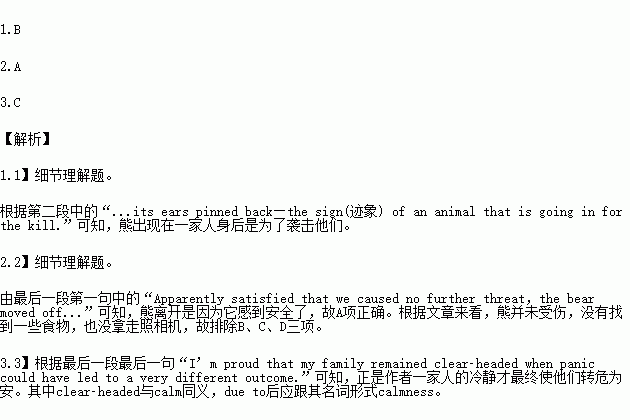题目内容
The Brown Bear
My wife Laura and I were on the beach,with three of our children,taking pictures of shore birds near our home in Alaska when we spotted a bear. The bear was thin and small,moving aimlessly.
Just a few minutes later,I heard my daughter shouting,“Dad!The bear is right behind us!” An aggressive bear will usually rush forward to frighten away its enemy but would suddenly stop at the last minute. This one was silent and its ears pinned back—the sign(迹象) of an animal that is going in for the kill. And it was a cold April day. The bear behaved abnormally,probably because of hunger.
I held my camera tripod(三脚架) in both hands to form a barrier as the bear rushed into me. Its huge head was level with my chest and shoulders,and the tripod stuck across its mouth. It bit down and I found myself supporting its weight. I knew I would not be able to hold it for long.
Even so,this was a fight I had to win:I was all that stood between the bear and my family,who would stand little chance of running faster than a brown bear.
The bear hit at the camera,cutting it off the tripod. I raised my left arm to protect my face;the beast held tightly on the tripod and pressed it into my side. My arm could not move,and I sensed that my bones were going to break.
Drawing back my free hand,I struck the bear as hard as I could for five or six times. The bear opened its mouth and I grasped its fur,trying to push it away. I was actually wrestling(扭打) with the bear at this point. Then,as suddenly as it had begun,the fight ended. The bear moved back towards the forest,before returning for another attack—the first time I felt panic.
Apparently satisfied that we caused no further threat,the bear moved off,destroying a fence as it went. My arm was injured,but the outcome for us could hardly have been better. I’m proud that my family remained clear?headed when panic could have led to a very different outcome.
1.The brown bear approached the family in order to .
A. catch shore birds
B. start an attack
C. protect the children
D. set up a barrier for itself
2.The bear finally went away after it .
A. felt safe
B. got injured
C. found some food
D. took away the camera
3.The writer and his family survived mainly due to their .
A. pride
B. patience
C. calmness
D. cautiousness

